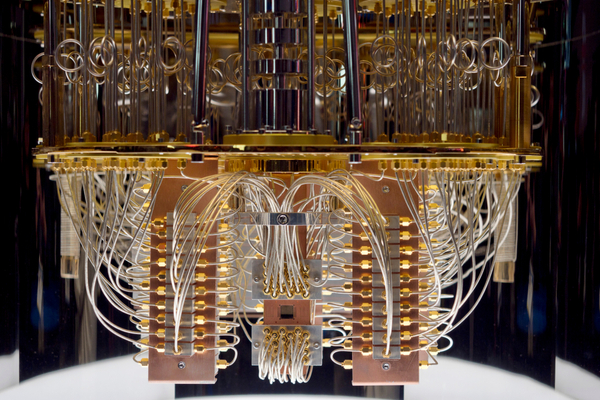Why is Israel investing millions of shekels to develop a blue and white quantum computer?
By Pesach Benson, United With Israel
Israel announced plans to invest 200 million shekels ($62.1 million) to build the country’s first quantum computer.
The initiative, led by the Israel Innovation Authority (IIA) and the Defense Ministry’s Directorate of Research and Development (MAFAT) aims to establish Israeli independence in the area of quantum computing.
Quantum computing is expected to revolutionize the speed and volume of computer processes. The U.S. and China are currently regarded as world leaders in the field. Other countries making headway are Canada, Germany, Japan and India.
“Quantum computing is a technology Israeli industry cannot ignore. The industry must develop knowledge and access to infrastructure in which it can develop growth engines for activities in which it will decide to lead,” said Dror Bin, Israel Innovation Authority CEO.
However, quantum computing is not well-understood.
What is Quantum Computing?
Describing the inner workings of a quantum computer isn’t easy, even for top scholars. That’s because the machines process information at the scale of elementary particles such as electrons and photons, where different laws of physics apply.
“It’s never going to be intuitive,” said Seth Lloyd, a mechanical engineering professor at the Massachusetts Institute of Technology. “At this microscopic level, things are weird. An electron can be here and there at the same time, at two places at once.”
Conventional computers process information as a stream of bits, each of which can be either a zero or a one in the binary language of computing. But quantum bits, known as qubits, can register zero and one simultaneously.
What Can It Do?
In theory, the special properties of qubits would allow a quantum computer to perform calculations at far higher speeds than current supercomputers. That makes them good tools for understanding what’s happening in the realms of chemistry, material science or particle physics.
That speed could aid in discovering new drugs, optimizing financial portfolios and finding better transportation routes or supply chains. It could also advance another fast-growing field, artificial intelligence, by accelerating a computer’s ability to find patterns in large troves of images and other data.
What worries intelligence agencies most about the technology’s potential is that a quantum computer could in several decades be powerful enough to break the codes of today’s best cryptography.
Today’s early quantum computers, however, fall well short on that front.
Where Can You Find a Quantum Computer?
While quantum computers don’t really exist yet in a useful form, you can find some loudly chugging prototypes in a windowless lab about 40 miles north of New York City.
Qubits made from superconducting materials sit in colder-than-outer-space refrigerators at IBM’s Thomas J. Watson Research Center. Take off the cylindrical casing from one of the machines and the inside looks like a chandelier of hanging gold cables — all of it designed to keep 20 fragile qubits in an isolated quantum state.
“You need to keep it very cold to make sure the quantum bits only entangle with each other the way you program it, and not with the rest of the universe,” said Scott Crowder, IBM’s vice president of quantum computing.
IBM is competing with Google and startups like Berkeley, California-based Rigetti Computing to get ever-more qubits onto their chips. Microsoft, Intel and a growing number of venture-backed startups are also making big investments. So are Chinese firms Baidu, Alibaba and Tencent, which have close ties to the Chinese government.
But qubits are temperamental, and early commercial claims mask the ongoing struggle to control them, either by bombarding them with microwave signals — as IBM and Google do — or with lasers.
“It only works as long as you isolate it and don’t look at it,” said Chris Monroe, a University of Maryland physicist. “It’s a grand engineering challenge.”
Why Does This Need Government Support?
“The infrastructure required, the hardware, the personnel, is way too expensive for anyone to go in it alone,” said Prineha Narang, a Harvard University assistant professor of computational materials science.
In the U.S., some federal agencies, including the departments of defense and energy, already have longstanding quantum research efforts, but advocates are pushing for more coordination among those agencies and greater collaboration with the private sector.
But the corporate world remains largely hesitant. The technical challenges are formidable, and it will be many years until quantum computing begins to generate payoffs for investors.
What is Israel’s Plan?
Israel’s foray into quantum will take two parallel tracks.
In one track, the Israeli Innovation Authority aims to develop and build a quantum computing infrastructure that would either work directly off of, or have access to the cloud. This infrastructure will enable researchers to test existing algorithms and be available for further research and development.
Technology from abroad may be partially used in the outset, but the goal is to integrate Israeli-made quantum processors and related technology. Israeli startups involved in peripheral technologies have already signaled interest.
On the second track, MAFAT will build a national center for quantum capabilities to coordinate and collaborate with academia, industry and national organizations. Its goal will be to develop the quantum hardware — processors, interfaces, algorithms and more.
Associated Press contributed to this report.
Do You Love Israel? Make a Donation - Show Your Support!
Donate to vital charities that help protect Israeli citizens and inspire millions around the world to support Israel too!
Now more than ever, Israel needs your help to fight and win the war -- including on the battlefield of public opinion.
Antisemitism, anti-Israel bias and boycotts are out of control. Israel's enemies are inciting terror and violence against innocent Israelis and Jews around the world. Help us fight back!



